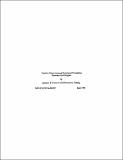| dc.contributor.author | Bernard, Andrew B. | en_US |
| dc.contributor.author | Chang, Pamela H. | en_US |
| dc.contributor.other | Massachusetts Institute of Technology. Center for Energy and Environmental Policy Research. | en_US |
| dc.date.accessioned | 2009-12-16T00:00:12Z | |
| dc.date.available | 2009-12-16T00:00:12Z | |
| dc.date.issued | 1994 | en_US |
| dc.identifier | 94004 | en_US |
| dc.identifier.uri | http://hdl.handle.net/1721.1/50206 | |
| dc.description.abstract | In this paper, we examine the determinants of the international trade in waste between developed countries. Data from the 1980s suggest that while the trade in waste between developed and less developed countries has garnered the most attention, the preponderance of waste flows have been among the developed countries. We examine both economic and institutional factors governing incentives to export and import waste. In particular, we find that countries with high cost of disposal tend to export but that low urban-rural population ratios, industry share in GDP, and population densities are also relevant for explaining the amount of waste that crosses national borders. | en_US |
| dc.description.sponsorship | Supported by the MIT Center for Energy and Environmental Policy Research. | en_US |
| dc.format.extent | 24 p | en_US |
| dc.publisher | MIT Center for Energy and Environmental Policy Research | en_US |
| dc.relation.ispartofseries | MIT-CEEPR (Series) ; 94-004WP. | en_US |
| dc.title | Trade in waste among developed countries : evidence and origins | en_US |
| dc.type | Working Paper | en_US |
| dc.identifier.oclc | 35720865 | en_US |
